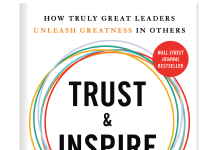By Darren Hardy
I’m about to walk you through one of the single greatest strategies I’ve ever used in my personal development. This strategy helps me take control of the choices I make throughout the day, causing everything else to fall into place, and leading to behaviors and actions that shepherd my habits into line like dutiful, loyal minions.
Right this moment: Pick an area of your life where you most want to be successful. Do you want more money in the bank? A trimmer waistline? The strength to compete in an Iron Man event? A better relationship with your spouse or kids? Picture where you are in that area, right now. Now picture where you want to be: richer, thinner, happier, you name it. The first step toward change is awareness. If you want to get from where you are to where you want to be, you have to start by becoming aware of the choices that lead you away from your desired destination. Become very conscious of every choice you make today so you can begin to make smarter choices moving forward.
To help you become aware of your choices, I want you to track every action that relates to the area of your life you want to improve. If you’ve decided you want get out of debt, you’re going to track every penny you pull from your pocket. If you’ve decided you want to lose weight, you’re going to track everything you put into your mouth. If you’ve decided to train for an athletic event, you’re going to track every step you take, every workout you do. Simply carry around a small notebook, something you’ll keep in your pocket or purse at all times, and a writing instrument. You’re going to write it all down. Every day. Without fail. No excuses, no exceptions. As if Big Brother’s watching you. As if my dad and I will come and make you do a hundred pushups every time you miss.
Doesn’t sound like much, I know—writing things down on a little piece of paper. But tracking my progress and missteps is the one of the reasons I’ve accumulated the success I have. The process forces you to be conscious of your decisions. But as Jim Rohn would say, “What’s simple to do is also simple not to do.” The magic is not in the complexity of the task; the magic is in the doing of simple things repeatedly and long enough to ignite the miracle of the Compound Effect. So, beware of neglecting the simple things that make the big things in your life possible. The biggest difference between successful people and unsuccessful people is that successful people are willing to do what unsuccessful people are not. Remember that; it will come in handy many times throughout life when faced with a difficult, tedious, or tough choice.
Money Trap
I learned the power of tracking the hard way, after I’d acted like a colossal idiot about my finances. Back in my early 20s, when I was making a lot of money selling real estate, I met with my accountant.
“You owe well over $100,000 in taxes,” he said.
“What?!” I said. “I don’t have that kind of cash just lying around.”
“Why not?” he asked. “You collected several times that; certainly, you set aside the taxes that would be due on that money.”
“Evidently I didn’t,” I said.
“Where did the money go?” he asked.
“I don’t know,” I said, a sobering confession, for sure. The money had passed through my hands like water, and I hadn’t even noticed!
Then my accountant did me a great favor.
“Son,” he said, looking me dead in the eyes, “you’ve got to get a grip. I’ve seen this a hundred times before. You’re spending money like a drunken fool, and you don’t even know how to account for it. That’s stupid. Stop it. You are now seriously in the hole. You have to earn more money that you’ll owe additional taxes on just to pay for your back taxes. Continue this, and you’ll dig your financial grave with your own wallet.”
I immediately got the message.
Here’s what my accountant had me do: carry a small notepad in my back pocket, and write down every single cent I spent for 30 days. Whether it was a thousand dollars for a new suit or 50 cents for air to fill up my tires, it all had to go down on the notepad. Wow. This brought an instantaneous awareness of the many unconscious choices I was making that resulted in money pouring out of my pockets. Because I had to log everything, I resisted buying some things, just so I didn’t have to take out the notepad and write it in the dang book!
Keeping a money log for 30 days straight cemented a new awareness in me, and created a completely new set of choices and disciplines around my spending. And, since awareness and positive behaviors compound, I found myself being more proactive with money in general, putting away more for retirement, finding areas to save where there was clear waste, and enjoying the fun quotient of money—“play money”—all the more. When I did consider shelling out for entertainment, I did so only after a long pause.
This tracking exercise changed my awareness of how I related to my money. It worked so well, in fact, that I’ve used it many times to change other behaviors. Tracking is my go- to transformation model for everything that ails me. Over the years I’ve tracked what I eat and drink; how much I exercise; how much time I spend improving a skill; my number of sales calls; even the improvement of my relationships with family, friends, or my spouse. The results have been no less profound than my money-tracking wake-up call.
In buying this book, you’re basically paying me for my opinion, my guidance. This is where I’m going to become a hard-ass and insist you track your behaviors for at least one whole week. This book isn’t designed to entertain you; it is designed to help you get results. To get results, you have to take some action.
You may have heard about tracking before. In fact, you’ve probably done your own version of this exercise. But I also bet you aren’t doing it now, right? How do I know? Because your life isn’t working as successfully as you’d like. You’ve gotten derailed. Tracking is the way to get it back on track.
Do you know how the casinos make so much money in Vegas? Because they track every table, every winner, every hour. Why do Olympic trainers get paid top dollar? Because they track every workout, every calorie, and every micronutrient for their athletes. All winners are trackers. Right now, I want you to track your life with the same intention: to bring your goals within sight.
Tracking is a simple exercise. It works because it brings moment-to-moment awareness to the actions you take in the area of your life you want to improve. You’ll be surprised at what you will observe about your behavior. You cannot manage or improve something until you measure it. Likewise, you can’t make the most of who you are—your talents and resources and capabilities—until you are aware of and accountable for your actions. Every professional athlete and his or her coach track each performance down to the smallest minutiae. Pitchers know their stats on every pitch in their repertoire. Golfers have even more metrics on their swings. Professional athletes know how to adjust their performances based on what they’ve tracked. They pay attention to what they record and make changes accordingly, because they know when their stats improve, they win more games and earn more in endorsement deals.
At any given moment, I want you to know exactly how well you’re doing. I’m asking you to track yourself as if you’re a valuable commodity. Because you are. Want that idiot-proof system we talked about earlier? This is it. So, regardless of whether you think you’re aware of your habits or not (believe me, you’re not!), I’m asking you to start tracking. Doing so will revolutionize your life, and ultimately, your lifestyle.
Darren Hardyhas been a leader in the personal-development industry for nearly two decades. As publisher and editorial director of SUCCESSMagazine, he has interviewed leading experts on human performance and achievement, as well as many of today’s top CEOs, entrepreneurs, and superstar athletes. An entrepreneur himself, Hardy was earning a six-figure income by age 18, more than a million dollars a year by age 24, and owned a $50 million a year business by age 27. He has mentored thousands of entrepreneurs, advised many large corporations, and serves on the boards of several companies and nonprofit organizations.




